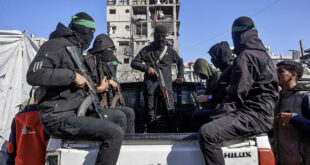KING ABDULLAH ON Tuesday offered to host a meeting in Amman between Palestinian President Mahmoud Abbas and Prime Minister Ismail Haniyeh to defuse escalating Fateh-Hamas tension.
The King also held talks with Israeli Premier Ehud Olmert, who arrived in Amman on a two-hour visit on a request by the Monarch, and pushed him to resume peace negotiations with the Palestinians.
According to a Royal Court official, King Abdullah telephoned Abbas and said Jordan was working hard to help Palestinians overcome their differences and ready to host a meeting between the president and Haniyeh to look into ways of ending political tension between Hamas and Fateh.
The Monarch said Jordan sought to end bloodshed and infighting in Palestinian territories, the official said.
At his meeting with Olmert, King Abdullah urged Israel to resume talks with the Palestinians to help revive the peace process.
“The King told Olmert that Palestinians and Israelis should be confident that they are credible partners for peace, which can only be achieved through negotiations and adherence to international commitments,†the official said.
“Wasting time with blame-laying, exchanging accusations and hesitance to take action for peace will widen the cycle of violence in the Middle East, everyone in the region will pay a heavy price,†the King warned. “Peoples of the region are tired of waiting and moving from one peace conference to another without tangible achievements.†King Abdullah reiterated that unilateral policies have failed and the Palestinians and Israelis should acknowledge that they have to reach a political settlement to meet their aspirations for peace and security.
Supporting the Palestinians by the international community, including Israel itself, is key for peace, he said, adding that a two-state solution should be the basis for the revival of negotiations.
On Tuesday, King Abdullah told visiting US senators John Kerry (D-MA) and Christopher Dodd (D-CT), US should enhance efforts to help achieve peace and stability in the Middle East.
The King urged Israel to “seriously and positively consider†the Arab Peace Initiative, which he described as a framework for resolving the Arab-Israeli conflict on all fronts.
Olmert, for his part, spoke about steps that Israel could take in the near future to revive the peace process with the Palestinians. He said both sides needed international support “now more than ever†to achieve peace.
Â
New pledges
Â
Gunbattles between Hamas forces and those loyal to Abbas raged on Tuesday in the Gaza Strip, where six fighters were killed before both sides issued new pledges to hold their fire. After a day of factional bloodshed, Hamas and Fateh security chiefs appeared side by side to declare that Haniyeh and Abbas had agreed to the withdrawal of their forces from the streets.
A previous ceasefire deal broke down within 24 hours and it was unclear whether this one, scheduled to take effect at 11:00pm (2100 GMT), would hold. The day’s death toll was the highest since internal fighting intensified over the weekend. Four of the six were killed in street battles. The bodies of two of Abbas’ security men were found dead hours after their abduction, hospital officials said. Concerned events were spinning out of control, Western and Arab nations urged a halt to the fighting.
The internal violence, the worst in a decade, has escalated since Abbas called for early elections on Saturday to try to break a political deadlock with the Hamas government.
Hamas has described his move as a “coup”.
Haniyeh reiterated in a speech broadcast live on television that the movement rejected Abbas’ election call and accused the United States of spearheading efforts to bring down his government. Hamas has said it would boycott any polls.
In Gaza City, civilians fled for safety and some shops closed as gunmen fought running battles with automatic weapons and rocket-propelled grenades.
“This is madness,” said taxi driver Adel Mohammad-Ali, 40.
“The streets are divided between Hamas and Fateh gunmen. You never know who is who.” US Secretary of State Condoleezza Rice said the violence had to stop. “We hope that there will in fact be a ceasefire between the parties. That is very important,” Rice told Al Arabiya television.
Regional powerhouse Saudi Arabia urged Palestinians to overcome their differences.
The latest ceasfire agreement, brokered by Egyptian mediators and announced at a joint news conference by the security chiefs, calls for “all armed men” to leave the streets, and for Hamas and Fateh forces to return to positions held before the fighting intensified.
The deal requires various factions to also free hostages they were holding.
Committed to elections
Â
Abbas said on Monday he was committed to early elections but left the door open for the formation of a Fateh-Hamas coalition with a “technocrat” Cabinet that could satisfy the West.
Hamas and Fateh tried for months to form a unity government to end a power struggle, but talks foundered, essentially over Hamas’ unwillingness to soften its stance towards Israel. Hamas beat Fateh in January parliamentary elections.
The rival factions have blamed each other for the surge in violence in which four Fateh and two Hamas fighters were killed.
Fateh sources said the two abducted security men had been “executed” by a Hamas-led police unit. A Hamas police spokesman denied the force had abducted or killed anyone.
At least a dozen people were wounded, including five children who were caught in the crossfire.
In the West Bank city of Nablus, an Islamic court judge aligned with Hamas was shot in the legs by unidentified gunmen.
Hamas, which advocates Israel’s destruction, has struggled to govern since taking office in March under the weight of Western sanctions imposed because of its refusal to recognise the Jewish state and renounce violence.
Washington and its allies have sought to strengthen Abbas, who favours a two-state solution to end conflict with Israel.
 Eurasia Press & News
Eurasia Press & News



